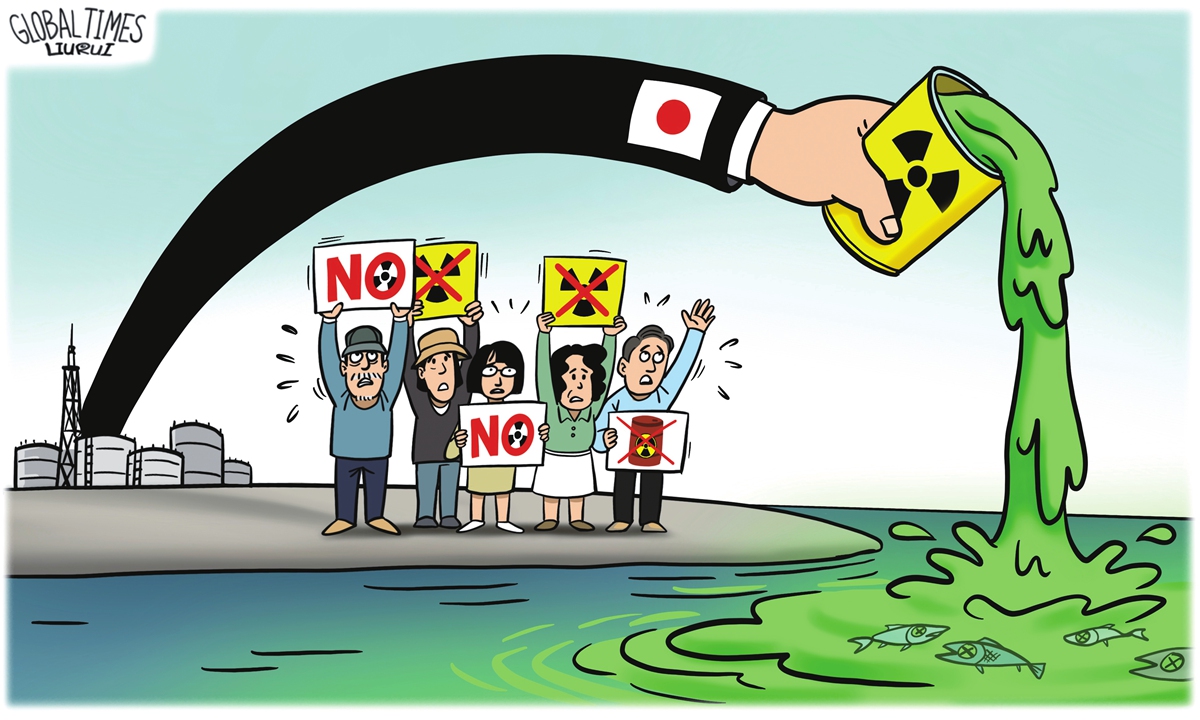International community cannot tolerate Japan’s nuclear-contaminated water dumping

Japan's dangerous move.Illustration:Liu Rui/GT
Japan is making final preparations for dumping nuclear-contaminated wastewater into the sea. According to local media reports, Japan's nuclear regulator finished inspecting a newly completed system to release radioactive water from the Fukushima Daiichi nuclear plant into the sea, presenting a posture that everything is ready. Rafael Mariano Grossi, director General of the International Atomic Energy Agency (IAEA), will visit Japan from Tuesday to Friday, and the IAEA's final assessment report on Japan's dumping plan will soon be released. Will Grossi's attitude, or the IAEA's final assessment, change Japan's decision to dump wastewater into the sea? It seems unlikely.
In fact, the Japanese side officially approved the dumping plan as early as July 22 last year. Since then, it has been working intensively on implementing the plan. At the same time, it has been spending a lot of effort on public relations, never taking seriously of the strong concerns at home and abroad, and failing to conduct adequate and well-intentioned consultations with stakeholders. And the IAEA is being targeted by the Japanese side as a priority in networking. Although the organization cannot give Japan a "license" and a "talisman" for dumping nuclear-contaminated water into the sea, the Japanese side may make an issue of how the IAEA writes its assessment report and draws its conclusions.
We still urge the IAEA to uphold the principles of objectivity, professionalism and impartiality, develop an assessment report that can stand the test of science and history, and not endorse the Japanese side's dumping plan. Tokyo's calculation is to force the international community to accept that what's done is done. Japan hopes that after resisting the pressure for some time, perhaps the international community's attention will turn to other areas, and the opposition to dumping nuclear-contaminated wastewater into the sea will weaken. We cannot let such a scheme succeed.
Now we need to be particularly vigilant that some governments and the Japanese side have reached a political deal over the issue of the wastewater dumping plan, which is a colluded betrayal of the public interest of mankind and marine ecology. Washington was the first to give Tokyo the green light for geopolitical reasons and then persuaded its other allies. The South Korean government has also started to release ambiguous messages frequently despite strong opposition from the public. To dispel the public's doubts, some lawmakers from the South Korean ruling party even went to the seafood market in groups to drink seawater from the breeding pond, and "even the fish in the pond found it ridiculous." Some European governments have also relaxed their attitude over the issue.
There have been concerns, objections, and questions about the discharge of nuclear-contaminated wastewater into the sea from ASEAN countries, Pacific Island countries, and others including Japan. Although the US and Japanese governments have tried to marginalize such voices, they have never disappeared. China's position as a major power is clear and has remained unchanged. The discharge of nuclear-contaminated wastewater into the sea is a matter of common interest for the international community, not a private matter for Japan. So China urges the Japanese side to stop pushing forward with the dumping plan, effectively dispose of the nuclear-contaminated water in a scientific, safe and transparent manner, and accept strict international supervision. This is a voice from a scientific and all-human perspective, which is justified and couldn't be alone.
In order to promote the safety of seafood from Fukushima, the Japanese government once attempted to use Fukushima's seafood in the meals of primary and secondary schools in the prefecture. However, all schools in Fukushima prefecture rejected this proposal. According to reports, content of Cs-137 in fish recently caught in the harbor of the Fukushima Daiichi Nuclear Power Plant is 180 times that of the standard maximum stipulated in Japan's food safety law, which is extremely alarming.
In this situation, claiming that the contaminated wastewater is safe is nothing but a lie. As officials from Pacific island countries have said, if the so-called "treated water" meets the standards and can be discharged, why doesn't Japan use this contaminated wastewater in its own country, especially in its agricultural sector?
Japan does have other more appropriate choices. The Japanese government has considered five different treatment options, but it ultimately chose the cheapest and easiest one, which is to discharge the contaminated wastewater into the ocean. From a technical standpoint, this is the solution with the lowest economic cost to Japan, but it releases the highest amount of radioactive substances into the global environment. Japan is unwilling to spend money on safely treating the contaminated wastewater but is willing to invest in public relations. According to recent reports from South Korean media, Japanese officials made political donations worth over EUR 1 million to the staff of the IAEA Secretariat and there has been no response to this matter so far.
According to a German marine scientific research institute, with the world's strongest currents along the coast of Fukushima, radioactive materials could spread to most of the Pacific Ocean within 57 days from the date of discharge. However, Japan has failed to provide a comprehensive and systematic monitoring plan for the disposal of nuclear-contaminated wastewater into the sea. The current monitoring scope is small, with few sampling points and low frequency, making it difficult to timely detect abnormal situations such as discharging pollutants in levels that exceed the stipulated standards. In short, Japan's forceful disposal of nuclear-contaminated water into the sea is illegal and violates a series of international legal obligations, constituting a crime against all of humanity. China and the international community's forces of justice stand together against such behavior and will never compromise or tolerate it.
Photos
Related Stories
- China slams Japan's Fukushima water discharge plan
- Discharge of tritium from Fukushima to harm human body, scientist says in S. Korea
- TEPCO says tanks for nuclear wastewater at Fukushima plant won't be full until Feb.
- China urges Japan to properly handle issues related to decommissioning of Fukushima nuclear power plant
- Facility construction begins for Japan's Fukushima nuclear wastewater release amid opposition
- China voices concern over Japan's plan to discharge nuclear-contaminated water into sea
- Japan's nuclear regulator approves plan to discharge radioactive wastewater from Fukushima plant into ocean
- China urges Japan not to dump contaminated water from Fukushima nuclear power plant into sea
- Interview: Opposition mounts to planned release of Fukushima water into Pacific, says British expert
- Japan severely breaches obligations under international law by persisting in discharge of nuclear-contaminated water into ocean
Copyright © 2023 People's Daily Online. All Rights Reserved.









